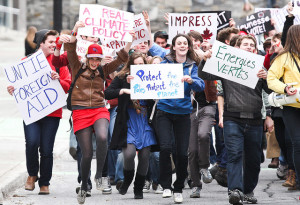Votes at 16 should be part of the systemic reform needed to counter youth abstention from democratic institutions
Andrew Mycock and Jonathan Tonge argued on Democratic Audit recently that lowering the voting age to 16 in the UK should not be considered while much wider and political reform is required to engage young people. In this post Benjamin Bowman responds, suggesting that enfranchising should be part of this systemic reform, and would place the right to vote within the toolkit of action they can take to influence the democratic process.

Young people: they’re always off getting married, joining the military, and spraying graffiti. Credit: David Spender, CC BY 2.0
In my contribution to the Democratic Audit series on votes at 16, I would like to pose a question beyond the traditional nexus of young people’s rights and hopes to increase their turnout. Why do we want young people to vote at all?
In a previous article on votes at 16 I suggested that votes for 16 and 17-year-olds must be part of a broader move towards welcoming young people as valued and equal citizens in UK democracy. Systemic reform has already been discussed in this series by Andrew Mycock and Jonathan Tonge, who challenged that we must reform our political institutions before extending the Vote to 16 or else risk entrenching disillusionment, this time among a younger electorate. Here, I argue the case for votes at 16 as a part of reform, rather than a promise for afterwards.
Young absence or young abstention?
Young people are absent from institutional politics in the UK. In more precise terms, the UK could be said to have the worst record for the marginalization of young people of comparable countries in the EU-15: not only do young people in the UK participate less in elections and other traditional processes for political action (with two notable exceptions: petitioning and volunteer work), but there is also a significant generational gap between older citizens who continue to vote, contact MPs, attend demonstrations, and so on, and younger citizens who tend not to engage by traditional methods and remain absent as they get older.
In 2008, Shakuntala Banaji reflected on a case study of young responses to the Iraq war under the Blair government, and asked what could be done, if anything, to prevent the discovery that some politicians and governments are unresponsive to citizens’ civic and political engagement from turning young people away from democratic action to abstention or, in the contemporary case, the extreme right. Banaji’s suggestion is echoed more recently by James Sloam, who wrote that one result of the economic crisis, during which the interests of the young were considered insignificant or even expendable by the Con/Lib coalition, might be that young people are turned away from an institutional politics that they feel rejects them as worthy of representation.
The key term here is turned away. Young people don’t vote as much, to be sure. But that does not mean young people don’t ‘do politics’. The marginalization of young people in representative democracy is a complex subject which coexists with a new framework for doing politics. The hallmark of young people’s politics is diverse participatory acts, and new norms of political activity among young people place elections as just one of many ways to be political. Given the way youth abstention from elections has concentrated so much recent public focus on the role of young citizens in democracy and the incipient crisis of non-voting, we might consider whether abstention has, indeed, been a very effective way to hold our democratic system to account for its failings.
Placing votes at 16 in the political toolbox
Between the worrying truth that the UK is facing a democratic crisis due to the growing young absence from politics, and the optimism we might have about a new diversity of participatory political acts, we can locate a need to reform our democratic system in such a way that we sponsor and encourage healthy democratic action in diverse forms. This should include reform to support young people’s right to democratic action. A reversal of current policies contributing to the criminalization of young public protest is one place we could start; greater access to valued, direct engagement with political institutions and elites – such as meeting local councillors – might be an option. The driving force behind systemic reform to counter young abstention from democratic institutions must be that young citizens have the right to be represented in our democracy and the right to hold it to account if they are not.
As such, votes at 16 would place elections as an instrument for representation and oversight firmly into the toolbox of diverse methods for action. A recent study from the University of Vienna that examined votes at 16 in Austria – where it is already law – concluded that extended suffrage was no miracle cure for poor turnout, but resulted in something perhaps more interesting: 16 and 17-year-olds showed remarkably similar levels of knowledge and motivation at the ballot box, as well as comparable decision making on the ballot, to older generations. Although young people are not monolithic, and assuming we support elections in principle, this is deeply encouraging for votes at 16. The vote lives.
Votes now
Experience in Austria could be applicable in the UK, too. A rich body of research since the late 1990s indicates that young people in the UK remain supportive of elections in principle despite deep cynicism their efficacy in practice. Extending the vote to 16 and 17-year-olds now, as part of the systemic reform Mycock and Tonge discuss, would put elections firmly back into the toolbox for political action. Suffrage could be a headline reform that indicated to young citizens that their voices and their oversight are necessary to our democratic system.
More importantly, the vote can be made more secure among a diverse range of tools for democratic action that must also include direct and participatory methods like public demonstration, petitioning and civil society as political action and not just obedient citizenship. Finally, and as is perhaps most vital, the vote at 16 would put democratic oversight for systemic reform to a greater extent into the control of the citizens to which that reform is responsible. If reform of the political system will make democratic institutions more representative of and accountable to the young, we should commit to better representation and accountability now. Votes at 16 can be part of that.
—
This post is part of a series on youth participation based on the Political Studies Association project, Beyond the Youth Citizenship Commission. For further details, please contact Dr Andy Mycock. An electronic copy of the final report can be downloaded here.
Note: This post represents the views of the author and does not necessarily give the views of Democratic Audit or the LSE. Pleases read our comments policy before responding. Shortlink for this post: buff.ly/1g3yTj8
—
 Benjamin Bowman is research postgraduate at the University of Bath. His research exploring how young people construct identity and belongings, and their participation, engagement and disengagement with reference to British politics. He tweets at @bennosaurus.
Benjamin Bowman is research postgraduate at the University of Bath. His research exploring how young people construct identity and belongings, and their participation, engagement and disengagement with reference to British politics. He tweets at @bennosaurus.






 Democratic Audit's core funding is provided by the Joseph Rowntree Charitable Trust. Additional funding is provided by the London School of Economics.
Democratic Audit's core funding is provided by the Joseph Rowntree Charitable Trust. Additional funding is provided by the London School of Economics.
@bennosaurus argues for @votesat16 as part of wider reform of youth politics https://t.co/Zjy2Uh46S0 @HansardSociety @Demos @IPPR
@bennosaurus argues for @votesat16 as part of wider reform of youth politics https://t.co/Zjy2Uh46S0 @LiberalYouth @YoungLabourUK @ConsFuture
@bennosaurus argues for @votesat16 as part of wider reform of youth politics @bycLIVE @OfficialSYP @UKYP https://t.co/Zjy2Uh46S0
While we’re talking about the vote, a little plug for my article this week: On young people, votes and UK politics https://t.co/5vjlSfTgZm
Young people need the vote in their political toolbox #votesat16 from @bennosaurus on Democratic Audit https://t.co/V3dCCnsBQO
[intstg] MT@PJDunleavy: Votes at 16 should b to counter #youth #abstention https://t.co/YW0h4dTD3X #voting
Votes at 16 should be part of the systemic reform needed to counter youth abstention from democratic institutions https://t.co/YCHVeADJM8
The Vote at 16 won’t fix our broken democracy – but it’s a start. Me on @votesat16 in @democraticaudit https://t.co/RujjVvVlcI @Youth_Forum
Votes at 16 should be part of the systemic reform needed to counter youth abstention from democratic institutions https://t.co/a49j7Udjyg